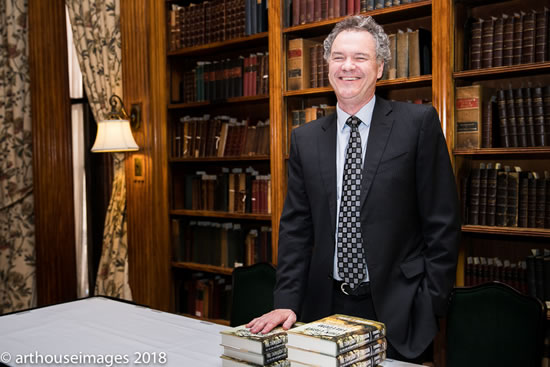2018 Gilder Lehrman
Lincoln Prize Awarded

Edward L. Ayers
The 2018 Gilder Lehrman Lincoln Prize was awarded to Edward Ayers for his book, The Thin Light of Freedom: The Civil War and Emancipation in the Heart of America (W.W. Norton and Company).
Ayers was recognized during an event hosted by Gettysburg College and the Gilder Lehrman Institute of American History at the Union League Club in New York City recently. In addition to a $50,000 prize, he also received a bronze replica of Augustus Saint-Gaudens’ life-size bust “Lincoln the Man.”
Also announced at the annual event was the establishment of a new Gilder Lehrman NEH Professorship of Civil War Era Studies at Gettysburg College. Combined with a grant from the National Endowment for the Humanities and gifts from alumni, parents, and friends, the Professorship endowment will exceed $2,000,000.
“Edward Ayers’s Thin Light of Freedom makes the Civil War vividly, unforgettable real by focusing on ordinary people, in ordinary communities, during the bloodiest crisis in American history,” said James G. Basker, President of the Gilder Lehrman Institute of American History. “Both students of history and general readers will find this book exciting and enlightening.”
Basker is one of the six Gilder Lehrman Lincoln Prize Board members who decided this year’s winner. In addition to Richard Gilder and Lewis Lehrman, principals of the Gilder Lehrman Institute of American History in New York and co-creators of the Gilder Lehrman Collection, other board members include Gettysburg College President Janet Morgan Riggs and Trustees Emeriti David LeVan and H. Scott Higgins.
“It is always remarkable to see the quantity and quality of scholarly work that is produced each year about Lincoln and the Civil War era, and we have special appreciation for work that will engage the public,” Riggs said. “By telling the stories of three communities spanning the Mason-Dixon line, Ayers helps us understand not only the military history of this time period, but also the political forces at work during the time of Reconstruction.”
The laureate was recommended to the board by a three-person jury: James Oakes, Distinguished Professor of History and Graduate School Humanities Professor at the Graduate Center of the City University of New York; Elizabeth Varon, Langbourne M. Williams Professor of American History at the University of Virginia; and Peter Cozzens, a prize-winning historian and former Foreign Service Officer.
“Ayers deftly blends military, social, and political history to offer a panorama of the war that both includes a wide range of actors and tells individual stories on an intimate scale,” wrote the jury in their report to the board. “Ayers’s study reflects his own deep immersion in both the primary source record and modern scholarship. Thanks to Ayers’ accessible writing style and skill at humanizing the war, The Thin Light of Freedom expertly conveys to its readers the vibrancy of the field of Civil War studies.”
About the Gilder Lehrman Lincoln Prize
The Lincoln Prize is awarded annually by Gettysburg College and the Gilder Lehrman Institute of American History to a work that enhances the general public’s understanding of the Civil War era.
The Prize was co-founded in 1990 by businessmen and philanthropists Richard Gilder and Lewis Lehrman, co-chairmen of the Gilder Lehrman Institute of American History in New York and co-creators of the Gilder Lehrman Collection.
About the Gilder Lehrman Institute of American History
Founded in 1994 by Richard Gilder and Lewis E. Lehrman, visionaries and lifelong supporters of American history education, the Gilder Lehrman Institute of American History is the leading American history nonprofit organization dedicated to K–12 education while also serving the general public. The Institute’s mission is to promote the knowledge and understanding of American history through educational programs and resources. As a 501(c)(3) nonprofit public charity the Gilder Lehrman Institute of American History is supported through the generosity of individuals, corporations, and foundations. The Institute’s programs have been recognized by awards from the White House, the National Endowment for the Humanities, and the Organization of American Historians. #
